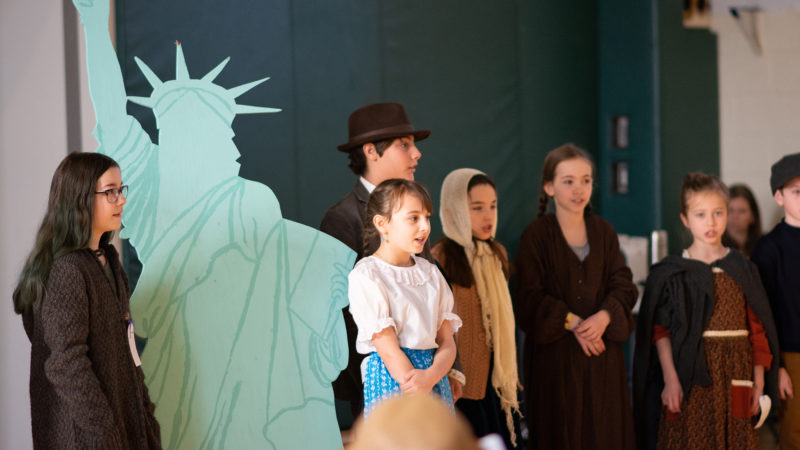The Ellis Island experience in 4-5
Most of the curriculum in Waynflete’s 4-5 program is thematically driven. We believe students learn best when the content they are learning is interdisciplinary and hands on. 4-5 teachers collaborate to connect writing, science, history, and literature. Major thematic studies include local foods, the marsh, westward movement, and immigration.
 This past December, 4-5 students participated in an Ellis Island simulation. This experience culminated a six week thematic focus on immigration and the Industrial Revolution. Through the thematic approach, students read historical fiction in literature; examined mill life; studied water cycles, land use, and water wheels in science; and examined historical and current influences of immigration. They interviewed immigrants and crafted nonfiction narratives to relate stories in writer’s workshop. They studied their own family histories and created family trees. The breadth and depth of the study can be seen by visiting the 4-5 blog.
This past December, 4-5 students participated in an Ellis Island simulation. This experience culminated a six week thematic focus on immigration and the Industrial Revolution. Through the thematic approach, students read historical fiction in literature; examined mill life; studied water cycles, land use, and water wheels in science; and examined historical and current influences of immigration. They interviewed immigrants and crafted nonfiction narratives to relate stories in writer’s workshop. They studied their own family histories and created family trees. The breadth and depth of the study can be seen by visiting the 4-5 blog.
For over 20 years, the Ellis Island simulation has ignited interest in history and has become a well-loved tradition in the Lower School. After exploring their own family’s history, students create a character based on their research. They come to school in period clothing, carrying birth certificates and passports that they created themselves. The simulation requires that these 4-5 immigrants board a ship and arrive at Ellis Island where they are immediately examined as they descend the Staircase of Separation and continue to be interviewed at various health and legal stations in the Great Hall.
 With parents volunteering as immigration officials, students might be asked how much money they have, to complete a puzzle, or even undergo a lice check. All the while, multiple languages can be heard booming on the loudspeaker instructing immigrants to keep their belongings by their side and to follow the instructions of the immigration officers. With the Statue of Liberty looking down upon the scene, student immigrants connect with one another as they recite the New Colossus. The experience is exciting, loud, and somewhat nerve wracking. The goal is to provide an experience for students so that their learning comes alive.
With parents volunteering as immigration officials, students might be asked how much money they have, to complete a puzzle, or even undergo a lice check. All the while, multiple languages can be heard booming on the loudspeaker instructing immigrants to keep their belongings by their side and to follow the instructions of the immigration officers. With the Statue of Liberty looking down upon the scene, student immigrants connect with one another as they recite the New Colossus. The experience is exciting, loud, and somewhat nerve wracking. The goal is to provide an experience for students so that their learning comes alive.
In reflecting on the experience, 4-5 students identified a number of key concepts:
“I really had a lot of fun. I got an ‘L’ chalk mark which meant lameness. I was nervous and I rubbed off my letter. One person took their jacket off and turned it inside out.”
“It was hard to imagine that this is what really happened to immigrants. They must have been really nervous. I wonder if the real Carola Adami felt that way when she went through the real Ellis Island?”
“The lines were long, but then I thought they must have been longer when there were two hundred or so people doing this for real.”
“When I got in line I felt very nervous. It was confusing at first. All I had to do was follow the flow of the crowd.”
“Everyone was excited when we boarded the ship.”
“A guard marked my back when we got to the door of Ellis Island. I was nervous about that.”
“Some of the inspectors were suspicious when I told them my story.”
“I liked hearing where people were from and all of their names.”
 “It was hard to listen because you felt so tired of sitting in a chair. I noticed that some of the people were stressed, some calm, and some sad. It was a good experience to have because you felt the stress that the real immigrants had to carry on their shoulders.”
“It was hard to listen because you felt so tired of sitting in a chair. I noticed that some of the people were stressed, some calm, and some sad. It was a good experience to have because you felt the stress that the real immigrants had to carry on their shoulders.”
Some students even reflected while remaining in character:
“I met a blacksmith whose shop burned down so he came to America for a better life.”
“Traveling to America was rough. During the intelligence test I could feel the pressure gleaming on me. During the medical test I knew they were not happy with the fact I had lice on the boat. At the legal station the people weren’t happy that I only had $1.50 to come across with, but I had paid all my money to get a ticket on the Baltic, the ship I took to America. The boat ride here was filled with sickness and sadness. When I arrived in Ellis Island I felt freedom. All of the people were happy with diversity. Now I am going to live with my sisters to get a job and live a happy life.”



